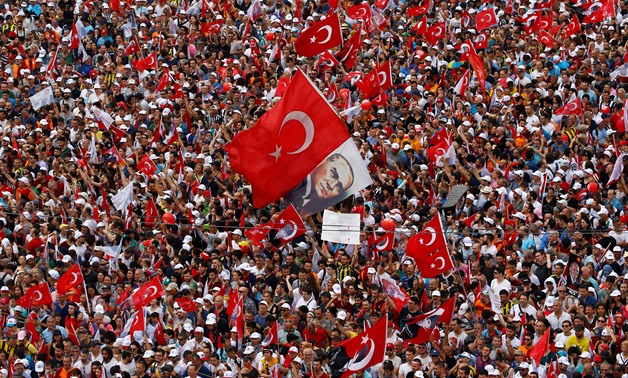
Supporters of Muharrem Ince, presidential candidate of Turkey's main opposition Republican People's Party (CHP), attend an election rally in Istanbul, Turkey June 23, 2018. REUTERS/Osman Orsal
CAIRO – 24 June 2018: Approximately 56 million Turkish citizens have been heading to polling stations to cast their vote in the twin elections as Turks have to elect in one ballot card their favorite presidential candidate and parliamentary party. Six presidential candidates are running for the presidential post including incumbent President Recep Tayyip Erdogan.
The run-off, if necessary, will take place on July 8 in case no candidate could obtain more than 50 percent of the valid votes in the first round, which is held in the presence of the emergency rule that followed the failed coup attempt of July 2016.
From this summer onward, the president of the republic of Turkey will form the government and there will be no prime minister.
Observers assert that the Turkish elections shall witness one of five possible scenarios. They are the first elections since the constitutional amendments of 2017, which transformed an 80-year-old parliamentarian system into a presidential one.
First : Erdogan wins the presidential election on June 24 poll and the 16-year-old Justice and Development Party (AKP) obtains a parliamentary majority as Erdogan wishes. When Erdogan called for a snap election, a year and a half before its normal date, he sought to surprise his opponents and the opposition parties so that they don't have enough time to get ready for the election’s race.
Second : The Turkish opposition parties succeed to go for a run-off round in July, so Erdogan will definitely lose some confidence.
Third : Erdogan wins, but the ruling AKP fails to secure the majority in the Parliament. This scenario will lead to more confusion and will negatively affect the Turkish economy. Therefore, a new election will be held later.
In 2015, AKP could not achieve the majority in the parliamentary election, so Erdogan hurried to call for holding a new election as he publicly announced he wouldn’t accept forming parliamentary coalitions with other political parties.
According to the constitutional amendments, approved in a referendum in April, 2017, Erdogan will be theoretically forced to call for a new presidential election if this scenario happens, because both presidential and parliamentary elections must take place simultaneously.
Fourth : The Republican People’s Party’s (CHP) charismatic Muharrem Ince wins in the run-off round and the opposition dominates the Parliament. Ince is the second powerful presidential candidate after President Erdogan.
Fifth : Turkish opposition wins the presidential election, but AKP keeps its dominance of the Parliament; especially that AKP has never witnessed such situation since it seized political power in 2002.

Comments
Leave a Comment